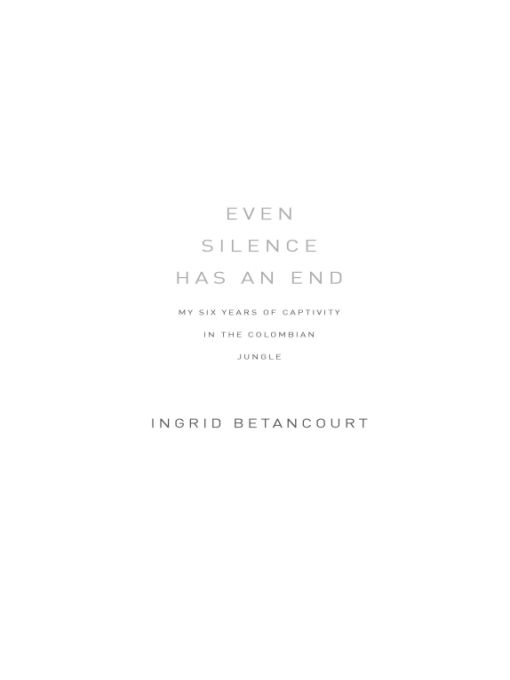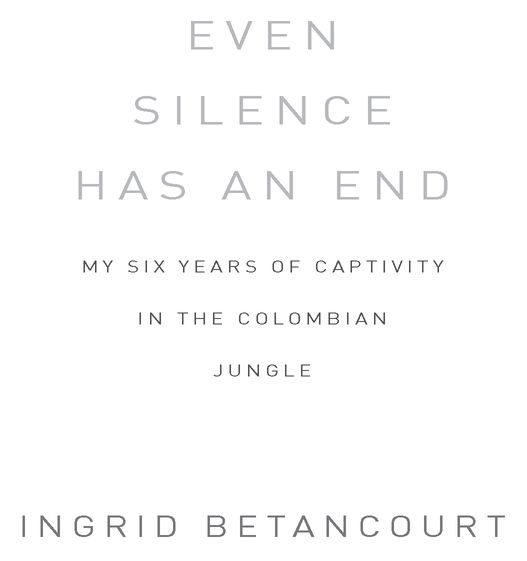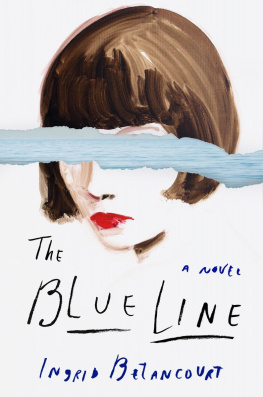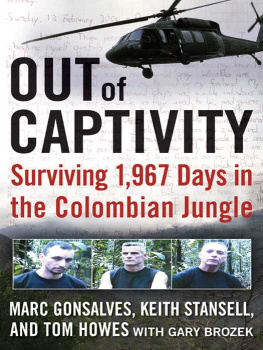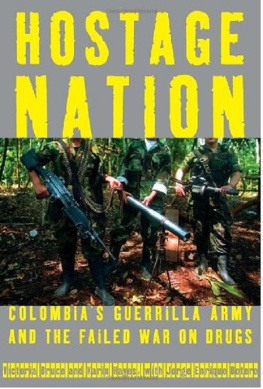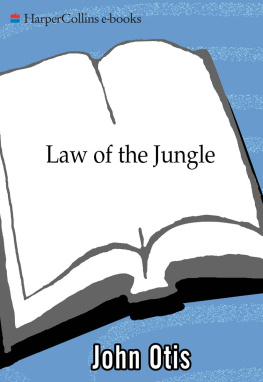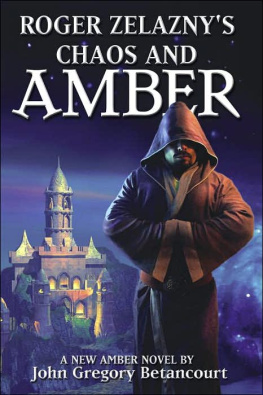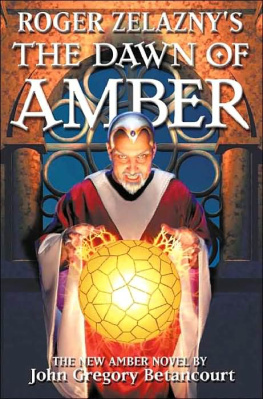Table of Contents
ALSO BY INGRID BETANCOURT
Until Death Do Us Part: My Struggle to Reclaim Colombia
Letter to My Mother
THE PENGUIN PRESS NEW YORK 2010
To my brothers who are still held hostage.
To my companions in captivity.
To all those who fought for our freedom.
To Astrid, Melanie, Lorenzo, Sebastian, and Fabrice.
To my mother
ONE
ESCAPING THE CAGE
DECEMBER 2002
I had made my decision to escape. It wasnt the first time. This was my fourth attempt, but after my last one the conditions of our captivity had become even more terrible. They had put us in a cage made of wooden boards, with a tin roof. Summer was coming, and for over a month now we had not had any storms at night. And a storm was absolutely necessary. I spotted a half-rotten board in a corner of our cage. By pushing hard with my foot, I split it enough to make an opening. I did this one afternoon after lunch, when the guard was dozing on his feet, balanced on his rifle. But it made a dreadful noise. The guard, edgy, walked all around the cage slowly, like a pacing animal. I followed him, peering through the slits between the boards, holding my breath. He stopped twice, put his eye up to a hole, and for a split second our eyes met. He jumped back, terrified. Then, to regain his composure, he planted himself at the entrance to the cage; this was his revenge. He would not take his eyes off me.
I avoided his gaze and thought carefully. Could someone squeeze through that opening? In principle, if you could get your skull through, your body would follow. In my childhood games, I squeezed through the bars of the fence at Parc Monceau, headfirst. It was always your head that blocked everything. But I was no longer so sure. It worked for the body of a child, but for an adult were the proportions the same? I was all the more worried because although we, Clara and I, were terribly thin, I had noticed over the last few weeks a sort of swelling of our bodies, probably liquid retention from enforced immobility. In my companion it was very visible. It was harder for me to judge my own condition, because we didnt have a mirror.
I had talked to her about this, and it had irritated her no end. Wed made two previous escape attempts, and the subject sowed tension between us. We didnt talk much. She was touchy, and I was prey to my own obsession. All I could think of was freedom, finding a way to escape from the hands of the FARC.
So I spent the entire day plotting, preparing in detail the equipment for our expedition, giving importance to stupid things. For example, I could not conceive of leaving without my jacket. I had forgotten that the jacket was not waterproof, and once it got wet it would weigh a ton. I also thought we ought to take the mosquito net along.
Ill have to figure out what to do about the boots. At night we always leave them in the same place, at the entrance to the cage. Ill have to start bringing them inside, so they get used to not seeing them anymore when were asleep.... And well have to get hold of a machete. To protect ourselves from wild beasts and to clear our way through the vegetation. It will be almost impossible. Theyre on their guard. They havent forgotten that we already managed to steal one when they were setting up the old camp.... Take scissorsthey lend them to us from time to time. I have to think about food, too. We have to stock up without their realizing. And it all has to be wrapped up in plastic, because well have to swim. It cant be too heavy, or well have difficulty making headway. We have to be as light as possible. And I must take my treasures: I cant possibly leave behind the photos of my children and the keys to my apartment.
I spent the day turning such questions over and over in my mind. Twenty times or more, I thought about our route once we were out of the cage. I tried to calculate all sorts of things: where the river must be, how many days it would take us until we could get help. I imagined the horror of an anaconda attacking us in the water, or an enormous cayman like the one whose red and shining eyes I had seen in the guards flashlight when we were coming down the river. I saw myself wrestling with a jaguar; the guards had regaled us with a ferocious description. I thought of everything that might possibly frighten me, to prepare myself psychologically and be ready to respond. I had to know how to control my emotions. Id decided that this time nothing would stop me.
I could think of nothing else. I no longer slept, because I understood that my brain worked better in the quiet of the evening. I observed, and I took note of everything: what time the guards changed watch, where each one stood, who stayed awake, who fell asleep, who would report to his replacement on the number of times wed gotten up to pee....
I also tried to continue communicating with my companion, to prepare her for the effort the escape would require, the precautions to take, the noises we must avoid making. She listened to me in silence, exasperated, and would only answer to refuse or disagree. We had to prepare decoys to leave where we slept, to give the impression of a body curled up on the bed. I was not allowed outside the cage, except to go to the chontos when nature called. This was an opportunity to rummage through the garbage dump in the hope of discovering some precious item.
I came back one evening with some bits of cardboard and an old sack that had been soaked in decomposing food: ideal to build our decoys. My behavior annoyed the guard. Because he didnt know whether he ought to forbid me from taking things, he shouted at me to get a move on, reinforcing his invective with a wave of his gun. As for Clara, my booty disgusted her, because she couldnt understand what possible use it might be.
I realized the gulf between us. Stuck together, reduced to a regime of Siamese twins who have nothing in common, we lived in opposite worlds: She was trying to adapt, I could only think of escape.
After a particularly hot day, the wind rose. The jungle went silent for a few moments. Not a single peep from a bird or rustling of a wing. We all turned toward the wind, to breathe in the weathera storm was approaching rapidly.
Activity in the camp became feverish. Everyone hurried to his task. Some checked the ropes on their tents, others set off at a run to pick up laundry drying in a patch of sunlight, others with greater foresight went to the chontos, in case the storm lasted longer than they could hold out.
I watched all this agitation, my stomach twisted in anxiety, and I prayed to God to give me the strength to go through with it. Tonight I shall be free. I repeated this sentence over and over, to ward off the fear that was contracting my muscles and draining my blood, while I struggled to make the gestures I had planned a thousand times during my sleepless nights: I waited until nighttime to build my decoy, folded the big black plastic sheet and slipped it inside my boot, unfolded the little gray plastic bag that would serve as a waterproof poncho, and checked to see if my companion was ready. I waited for the storm to break.
From my previous attempts, I had learned that the best moment to slip away was at dusk, the hour when wolves look like dogs. In the jungle this meant precisely 6:15 P.M. During the few minutes while our eyes adjusted to the darkness and before night fell completely, we were all blind.

